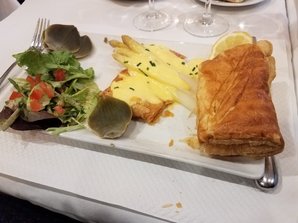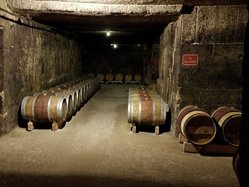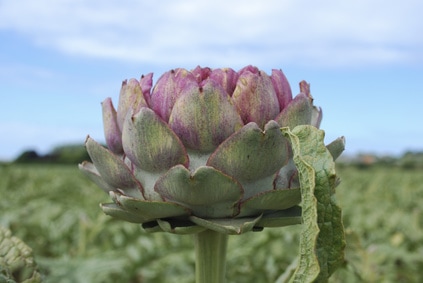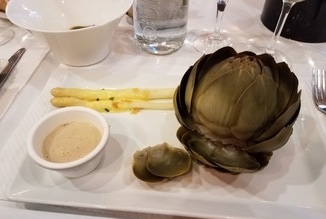We landed at Charles de Gaulle Airport outside Paris and flew on to Bordeaux, located in the south of France near the Atlantic coast. Our flight crossed the heart of France. It was a cloudless April day and I had a good view of the French countryside. Unlike the Midwest, the French countryside is divided into many small fields. Multiple crops grow in small patches. According to our trip guides, France is second only to the United States in terms of total agricultural output. But unlike the U.S., France’s output comes from many small farms, not from a large corporate agribusiness. Almost half of their total production is organic, or as the French call it, Biologique.
While attending elementary school in the 1950’s, I learned about crop rotation, contour farming to maintain healthy soil, and how to minimize the loss of topsoil. We are not doing this in the U.S. anymore, but the French still are.
Looking down at a field (while still in the air), the French
agri-system is obvious. The field has odd-looking shapes to accommodate the varied slopes of the landscape and is divided into different portions. One section has planted vegetables, and a nearby field is filled with fruit trees. A pasture with cattle, sheep or goats can be observed and finally, another is planted with grain or flowers. Interspersed throughout are small patches of forest. Between the fields are borders of flowers, bushes and trees. Any one area contains a whole ecosystem — it’s just not one single crop planted for miles and miles (as we see in the U.S.!).
Honeybees, birds and insects are the main pollinators of crops, but American honeybees are actually dying off. One reason is from our heavy use of insecticides and herbicides. Another reason is the poor diet of the pollinators themselves. With only corn, wheat or soy available for miles, the bees and other species have too narrow a diet. The French locations offer a variety of crops, trees, flowers and grasses, providing the pollinators with plenty of choices to accommodate their diet.
Travel can be educational. Americans do not have a monopoly on the best ways to live. I am not saying that France is perfect but they do have some great ideas that we could adopt. Most of their food is locally grown and the quality and flavor of their fruits and vegetables is wonderful.
Better tasting fruits and vegetables almost always have higher nutritional value. The tax and subsidies of American agribusiness was designed to favor large, corporate farms. Although food prices may go up somewhat, we would be much better off subsidizing small organic mixed-use farms instead of large farm businesses. We would need much smaller farm machines, fewer chemicals and there would be jobs for many more farmers. In the 1920’s, it required over 30% of the American population to raise our food. Today, just 2% of Americans have agricultural jobs. The American rural economy, the quality of our food, the health of our soil (and the health of the pollinators) would all be better if we raised our food more like the French.




 RSS Feed
RSS Feed